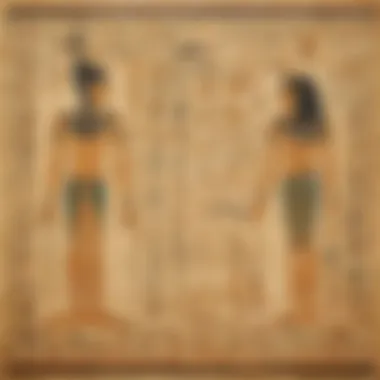Unveiling the Wonders: An Ancient Civilizations Homeschool Curriculum


Fun Activities Ideas
Mesopotamia and Egypt, ancient civilizations that stood the test of time, offer a treasure trove of opportunities for immersive exploration within a homeschool curriculum. Unlocking the secrets of the past, children can engage in exhilarating indoor activities like creating clay tablets to mimic ancient writing, or constructing mini pyramids from popsicle sticks for an insightful look into engineering marvels. Venturing outdoors, a visit to a local museum portraying ancient artifacts or organizing a mimic sand play excavation can transport young learners to ancient lands. Engaging in arts and crafts, kids can craft jewelry inspired by ancient Mesopotamian motifs or fashion Egyptian headdresses using cardboard and colored paper, delving deeper into cultural intricacies. In the realm of science, experiments like modeling how floods influenced fertile soil around the Nile can illuminate the practical applications of ancient knowledge. Cooking and baking can also become a cultural exploration through preparing ancient Mesopotamian barley porridge or baking pyramid-shaped cookies as a nod to Egyptian treats.
Educational Games
Within the vast expanse of ancient civilizations lie ample educational games to stimulate young minds. Mathematics and logic games such as
Introduction to Ancient Civilizations in Homeschooling
In the realm of homeschooling, delving into ancient civilizations holds a profound educational value. It serves as a gateway to unraveling the tapestry of human history, offering a nuanced understanding of our past. By immersing students in the world of Mesopotamia, Egypt, and beyond, we pave the way for a holistic educational journey that encompasses history, culture, and archaeology. Integrating ancient civilizations into the curriculum provides a unique opportunity to stimulate curiosity, foster critical thinking skills, and cultivate a sense of cultural empathy, laying the foundation for well-rounded global citizens.
Importance of Teaching Ancient Civilizations
Connecting Past to Present
Exploring the connections between ancient civilizations and the contemporary world is integral to fostering a sense of continuity and understanding of human development. By tracing the evolution of societal structures, technological advancements, and cultural practices from ancient times to modern-day, students gain a comprehensive perspective on the progression of human civilization. This comparative approach not only facilitates a deeper appreciation for the foundations of today's society but also encourages critical analysis of historical events and their enduring impact.
Cultural Appreciation
Studying ancient civilizations fosters a deep appreciation for diverse cultures, traditions, and belief systems that have shaped societies throughout history. By immersing students in the customs, art forms, and ideologies of ancient peoples, they develop a broader worldview and cultivate respect for cultural differences. This exploration of cultural diversity not only enhances students' empathy and understanding but also nurtures a sense of inclusivity and tolerance towards varying perspectives.
Critical Thinking Development
Integrating ancient civilizations into the curriculum stimulates students' critical thinking skills by challenging them to analyze complex historical contexts, interpret archaeological evidence, and evaluate differing perspectives. By engaging with primary sources, historical texts, and cultural artifacts, students hone their analytical abilities, learn to construct well-reasoned arguments, and develop a keen eye for detail. This cultivation of critical thinking prowess equips students with valuable skills for academic success, problem-solving, and decision-making in all facets of life.
Choosing the Right Curriculum
Curriculum Options Overview


When selecting a curriculum for teaching ancient civilizations, educators are presented with a myriad of options, each designed to cater to varying teaching styles and educational goals. From comprehensive textbooks to interactive online platforms, the array of curricular resources available allows for a tailored approach to meeting specific learning objectives. Educators can choose curricula that align with their pedagogical preferences, student's academic levels, and desired depth of historical exploration.
Customization for Learning Styles
One of the key advantages of incorporating ancient civilizations into homeschooling is the ability to customize learning experiences to cater to individual learning styles. By tailoring lesson plans, activities, and assessments to accommodate diverse learning preferences, educators can effectively engage students and maximize their potential for academic growth. Whether through hands-on projects, visual presentations, or auditory exercises, customization promotes personalized learning experiences that cater to each student's needs and strengths.
Benefits of Integrating Ancient Civilizations
Enhanced Historical Perspective
The integration of ancient civilizations enhances students' historical perspective by offering a rich tapestry of human experiences, innovations, and conquests to explore. By delving into the triumphs and challenges of past civilizations, students gain a nuanced understanding of the complexities of human history and the interconnected nature of global societies. This broader historical lens enables students to contextualize contemporary events, identify recurring patterns in human behavior, and appreciate the enduring impacts of ancient civilizations on modern-day society.
Cultural Awareness Growth
Exploring ancient civilizations nurtures students' cultural awareness by exposing them to the diverse customs, languages, and traditions of past societies. Through this exploration, students develop a heightened sensitivity to cultural differences, an appreciation for cultural heritage, and a curiosity about societal norms across various time periods. This cultural immersion not only promotes cross-cultural understanding but also instills in students a sense of global citizenship and a respect for cultural diversity.
Interdisciplinary Connections
The study of ancient civilizations offers interdisciplinary connections that extend beyond the realms of history and archaeology. By integrating subjects such as literature, art, mathematics, and science into the study of ancient cultures, educators foster a multidimensional approach to learning that encourages holistic understanding. These interdisciplinary connections enable students to explore the intersection of various disciplines, draw parallels between different fields of study, and cultivate a comprehensive worldview that transcends traditional academic boundaries.
Exploration of Key Ancient Civilizations
Exploring ancient civilizations is a pivotal aspect of this article, offering a profound opportunity to delve into the rich tapestry of human history. By highlighting key ancient civilizations such as Mesopotamia, Egypt, Greece, and Rome, learners are exposed to a myriad of cultural, societal, and historical insights that shape our world today. Exploring these civilizations not only fosters a deep appreciation for the past but also cultivates critical thinking skills and a well-rounded perspective on the evolution of human societies.
Mesopotamia
Mesopotamian Society and Culture
Mesopotamian society and culture represent a cornerstone in the annals of ancient history, with its innovative contributions leaving an indelible mark on civilization. The essence of Mesopotamian society lies in its sophisticated governance structures, advanced agricultural practices, and intricate belief systems. By exploring Mesopotamian society, learners gain a profound understanding of early urban development, long-lasting legal frameworks, and intricate religious practices. These aspects not only provide a gateway to comprehend the foundations of civilization but also offer insights into the complexities of social organization and cultural dynamics prevalent in ancient Mesopotamia.
Mesopotamian Society and Culture stand out as a pivotal choice for this article due to their intrinsic influence on subsequent civilizations and their role in shaping early societal norms and governance systems. The unique feature of Mesopotamian Society lies in its urban revolution and early forms of record-keeping, allowing learners to unravel the complexities of city-states and legal codes that have endured through the ages. While exploring Mesopotamian Society and Culture, learners can appreciate the significance of written language, monumental architecture, and religious beliefs that define the rich heritage of Mesopotamia.


Contributions to Civilization
The contributions of Mesopotamia to civilization are multifaceted and far-reaching, encompassing innovations in agriculture, mathematics, and governance. Mesopotamia's legacy resonates in the fields of irrigation techniques, numerical systems, and early forms of writing, all of which laid the groundwork for future advancements. By studying the contributions of Mesopotamia, learners engage with the origins of organized agriculture, the development of the cuneiform writing system, and the establishment of the first known legal code, Hammurabi's Code.
The significance of Mesopotamia's contributions to civilization is paramount in understanding the progression of human societies from hunter-gatherer communities to complex urban centers. By exploring these contributions, learners can grasp the transformative impact of agricultural practices, mathematical innovations, and legal principles, which continue to shape modern legal systems, numerical systems, and societal structures.
Ancient Egypt
Egyptian Mythology and Beliefs
Ancient Egypt's mythology and belief systems offer a captivating glimpse into the spiritual and cultural milieu of one of history's most enigmatic civilizations. The rich tapestry of Egyptian mythology weaves together intricate narratives of gods, pharaohs, and the afterlife, reflecting the Egyptians' deep reverence for divine entities and the journey of the soul beyond death. By delving into Egyptian mythology, learners embark on a voyage through the symbolic realm of gods and goddesses, understanding the religious rituals, burial practices, and worldview that defined ancient Egyptian spirituality.
Egyptian Mythology and Beliefs form a crucial component of this article, drawing readers into the archaic mysteries of the Nile's gifted civilization. The allure of Egyptian mythology lies in its symbolic representations of cosmic order, creation myths, and the cyclical nature of life and death. By exploring these beliefs, learners can appreciate the intricate cosmogony of ancient Egypt, unraveling the symbolic significance of deities like Ra, Osiris, and Isis in the tapestry of Egyptian religious thought.
Pharaohs and Pyramids
The enigmatic realm of pharaohs and pyramids stands as an iconic representation of ancient Egypt's grandeur and architectural prowess. Pharaohs, as divine rulers endowed with immense power and authority, oversaw the monumental construction projects that culminated in the creation of awe-inspiring pyramids. These colossal structures, both tombs and symbols of eternity, signify the ancient Egyptians' pursuit of immortalizing their rulers and ensuring their eternal journey in the afterlife. By exploring the realm of pharaohs and pyramids, learners unravel the mysteries of ancient Egyptian kingship, funerary rituals, and architectural achievements.
Pharaohs and Pyramids hold a prominent place in this article due to their enduring fascination and enduring legacy in popular culture and historical research. The unique allure of pharaohs lies in their dual roles as mortal rulers and god-kings, embodying the divine essence within a mortal frame. Simultaneously, the pyramids serve as enduring testaments to ancient engineering prowess, astronomical precision, and cultural beliefs surrounding death and the afterlife. By examining pharaohs and pyramids, learners encounter the majesty, mystery, and mastery of ancient Egyptian civilization.
Ancient Greece
Ancient Greek Contributions
The unparalleled contributions of ancient Greece resonate across the annals of human civilization, encompassing diverse fields such as philosophy, arts, and governance. Ancient Greek thinkers, artists, and statesmen laid the foundation for Western intellectual thought through their pioneering advancements in logic, democracy, and artistic expression. By exploring ancient Greek contributions, learners delve into the realms of democracy, mathematics, literature, and artistic innovations that continue to shape contemporary society.
Ancient Greek Contributions emerge as a central focus in this article, illuminating the transformative impact of Greek ingenuity on subsequent eras and global civilizations. The key characteristic of ancient Greek contributions lies in their emphasis on reason, individualism, and pursuit of knowledge, fostering a legacy of critical inquiry and intellectual freedom. Through the exploration of ancient Greek achievements, learners encounter the origins of disciplines such as philosophy, drama, and political theory, unveiling the enduring relevance of Greek ideals in modern society.
Athenian Democracy
Athenian democracy stands as a beacon of collective governance, embodying the ideals of citizen participation, egalitarianism, and rule of law in ancient Greek society. The Athenian democratic system, characterized by direct citizen involvement in decision-making processes, laid the groundwork for modern conceptions of democracy and citizenship. By delving into Athenian democracy, learners navigate the intricate mechanisms of political assembly, legal proceedings, and civic responsibilities that defined the Athenian polis.


Athenian Democracy plays a pivotal role in this article, shedding light on the evolution of political structures and civic engagement in ancient Greece. The unique feature of Athenian democracy lies in its emphasis on civic duty, public discourse, and the empowerment of ordinary citizens in shaping governmental policies. Through the exploration of Athenian democratic practices, learners uncover the roots of democratic governance, participatory politics, and civic rights that underpin modern democratic systems.
Ancient Rome
Roman Empire Expansion
The expansive reach of the Roman Empire marks a significant chapter in the annals of ancient history, reflecting Rome's military prowess, strategic governance, and territorial acquisitions. The rapid expansion of the Roman Empire across Europe, Asia, and Africa heralded an era of cultural assimilation, legal codification, and architectural innovation. By studying the Roman Empire's expansion, learners encounter the mechanisms of imperial conquest, administrative structures, and socio-cultural exchanges that defined the Roman world.
Roman Empire Expansion emerges as a crucial aspect of this article, illuminating the geopolitical maneuvers and conquest strategies that propelled Rome to imperial prominence. The key characteristic of Roman Empire Expansion lies in its amalgamation of military might, political diplomacy, and infrastructural development, shaping the contours of a vast imperial domain. Through the exploration of Rome's territorial acquisitions, learners unravel the complexities of imperial administration, provincial governance, and cross-cultural interactions that shaped the Roman Empire's multifaceted identity.
Roman Architecture and Engineering
Roman architecture and engineering epitomize the zenith of ancient engineering marvels, showcasing Rome's proficiency in urban planning, monumental construction, and aqueduct technology. The architectural feats of Rome, manifested in structures like the Colosseum, Pantheon, and aqueducts, stand as enduring testaments to Roman ingenuity, aesthetic grandeur, and engineering precision. By exploring Roman architecture and engineering, learners delve into the realms of urban infrastructure, architectural aesthetics, and technological advancements that defined the Roman architectural landscape.
Roman Architecture and Engineering hold a prominent position in this article, shedding light on Rome's contributions to architectural design, city planning, and civil engineering practices. The unique feature of Roman architecture lies in its fusion of Greek, Etruscan, and Egyptian influences, resulting in a distinctive Roman architectural style characterized by monumental scale and structural innovation. By examining Roman architectural marvels, learners unravel the complexities of concrete construction, arches, vaults, and domes that revolutionized architectural principles and influenced future building practices.
Practical Resources and Activities for Homeschooling
In the realm of homeschooling, the incorporation of practical resources and activities holds a paramount significance, acting as a crucial pillar in cultivating a holistic educational experience. These resources play a pivotal role in bridging theoretical knowledge with hands-on engagement, thereby enhancing the retention and application of concepts learned. By delving into practical resources and activities, students can grasp ancient civilizations' nuances more effectively, forging a deeper connection with the subject matter. In this article, the focus is on elucidating the key benefits of integrating such resources into homeschool curriculum, shedding light on how they cater to diverse learning styles and foster a comprehensive understanding of ancient civilizations.
Interactive Learning Tools
Online Archaeological Tours:
Online archaeological tours represent a pioneering approach in immersive learning experiences, offering learners a virtual excursion through historical sites and artifacts without geographical constraints. These tours stand out for their ability to transport students to ancient realms, enabling them to witness firsthand the marvels of bygone civilizations. Their interactive nature fosters an engaging learning environment, where history comes to life through vivid visuals and knowledgeable narrations. While online archaeological tours present a convenient and captivating mode of exploration, it's essential to acknowledge their inherent limitations, such as the lack of physical presence and tactile interaction. -#### Ancient Civilization Simulation Games: Ancient civilization simulation games present an intriguing blend of entertainment and education, making historical contexts approachable and engaging for learners. By immersing themselves in simulated scenarios, students can experience the complexities of ancient societies firsthand, providing a dynamic perspective on cultural norms, trade practices, and governance systems. The gamified approach not only stimulates critical thinking and problem-solving skills but also instills a sense of curiosity and exploration among players. However, it's crucial to balance gaming time with structured learning to ensure a wholesome educational experience.
Hands-On Projects
Building Pyramids Models:
Crafting pyramid models serves as a tactile and visual method for students to comprehend the architectural marvels of ancient Egypt. This hands-on project allows learners to delve into the structural intricacies of pyramid construction, enhancing their spatial reasoning and historical appreciation. The act of building models instills a sense of accomplishment and curiosity, paving the way for deeper inquiries into engineering feats of antiquity. While building pyramid models offers invaluable learning opportunities, it's essential to provide guidance and historical context to enrich the experience further. -#### Scribe Writing Practice: Engaging in scribe writing practice immerses students in the ancient art of recording information, fostering an understanding of communication systems prevalent in ancient civilizations. By transcribing texts or inscriptions, learners gain insight into the cultural importance of written language and the role of scribes in preserving historical records. This hands-on activity not only hones language skills but also cultivates an appreciation for the written word's enduring legacy. However, integrating scribe writing practice requires patience and meticulous attention to detail to ensure accurate depictions of ancient scripts.
Recommendations for Further Reading
Books on Ancient Civilizations:
Exploring books on ancient civilizations offers readers a deep dive into archaeological discoveries, historical accounts, and cultural narratives, enriching their understanding of past societies. These resources provide in-depth analyses and diverse perspectives on ancient civilizations, catering to enthusiasts and scholars alike. By delving into well-researched texts, students can broaden their historical horizons and cultivate a nuanced perspective on the evolution of human societies. While books on ancient civilizations serve as invaluable tools for expanding knowledge, selecting appropriate reading materials tailored to students' interests and academic levels is essential. -#### Archaeological Journals: Delving into archaeological journals opens up a realm of scholarly research and empirical studies, offering readers a glimpse into ongoing excavations, discoveries, and interpretations in the field of archaeology. These journals serve as reservoirs of specialized knowledge, providing insights into methodological approaches, theoretical frameworks, and interdisciplinary connections within the archaeological domain. Engaging with archaeological journals not only sharpens research skills but also fosters a critical appraisal of historical evidence and scholarly debates. However, navigating through academic publications requires analytical skills and a penchant for detail to extract meaningful information and contribute to an informed discourse.



